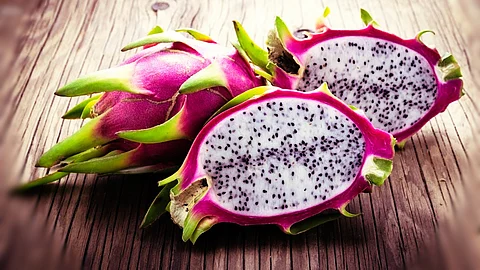

Pune: Farmers in Bavda, Indapur Taluka, are experiencing substantial income growth thanks to dragon fruit cultivation, which offers high yield with lower production costs.
Sachin Kale, a farmer who has cultivated dragon fruit since 2016, reports impressive production rates, with yields reaching up to 15 tons per acre. In local and urban markets, this exotic fruit fetches an average of ₹50 to ₹140 per kilogram, making it a profitable crop for farmers.
The 12-by-7-foot spacing method used by Kale, along with cement poles to support the plants, has enabled a well-managed orchard that maximizes yield.
“The production cost per acre is around ₹80,000,” Kale said. "We take preventive measures to avoid fungal infections and ant problems, which become an issue when the fruit ripens. Both organic and chemical fertilizers are used to keep the crop healthy.”
Beyond its economic benefits, dragon fruit cultivation offers other advantages. Farmers can grow four plants on a single cement pole, face fewer issues with pests and diseases, and save on crop protection costs.
The plants are resilient even during water shortages, though a lack of water may slightly reduce fruit size. Currently, the Red White variety is being harvested, and market prices range from ₹50 to ₹140 per kilogram depending on quality, with fruits often weighing between 600 to 800 grams.
Indapur Taluka has a significant portion of farmland dedicated to fruit crops, and many farmers are adopting new orchards to boost income.
“Dragon fruit is becoming increasingly popular here, and Sachin Kale’s orchard serves as an ideal model,” noted Bhausaheb Rupnavar, the Taluka Agriculture Officer. “We are working to share his experience so that other farmers can benefit from dragon fruit farming.”
Dragon fruit has also gained popularity for its health benefits. The fruit has thin skin and red or white flesh with a sweet taste. It is rich in antioxidants, vitamin C, and fiber, and is known to support conditions like diabetes, heart disease, and cancer.
Its high iron content aids digestion, and it is consumed to boost platelets during dengue infections. This nutrient-packed fruit also helps strengthen immunity, adding to its appeal in the market.
